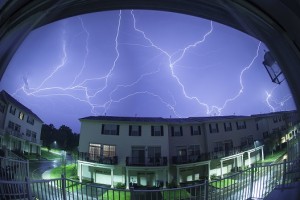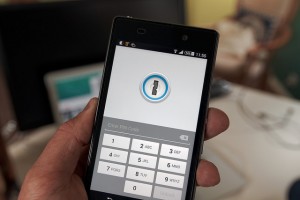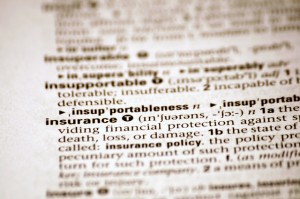 We all know the weather is unpredictable no matter how many radars or meteorologists tell us otherwise. Mother Nature is impulsive and she strikes at will. A common and sometimes unpleasant result of severe weather is power outages. During a thunderstorm outages may last a couple of hours but extreme weather conditions have been known to leave civilians without power for weeks at a time. The 2008 ice storm that swept the Northeast region of the United States is a perfect example of how detrimental volatile weather can be. It left over a million without power, some for weeks. How fast power can be restored really depends on the weather conditions and the resources available in each location.
We all know the weather is unpredictable no matter how many radars or meteorologists tell us otherwise. Mother Nature is impulsive and she strikes at will. A common and sometimes unpleasant result of severe weather is power outages. During a thunderstorm outages may last a couple of hours but extreme weather conditions have been known to leave civilians without power for weeks at a time. The 2008 ice storm that swept the Northeast region of the United States is a perfect example of how detrimental volatile weather can be. It left over a million without power, some for weeks. How fast power can be restored really depends on the weather conditions and the resources available in each location.
While extreme weather is not necessarily an everyday issue-and it varies by location-there is still an impact incurred by smaller and more frequent storms that cause power outages. Power outages affect not only lighting but heating, electric water pumps, and your home security system. Does that mean you will be unprotected during an outage? That depends on what type of system you have. At Perfect Connections, Inc. we provide customized security systems that help protect you and your family even in the direst of situations. Our experts have been securing homes in northern and central New Jersey since 1992. As we are based in New Jersey, we are no strangers to the inclement weather and its effect on local residences.
What happens during a power outage? Everyone goes scrambling for lanterns, candles, and maybe a puzzle to pass the time, right? Okay, so you have the entertainment portion down, but what about the safety of your home. Will your security system still work during a power outage? As previously mentioned that really depends on what type of system you have.
Some of the most common operating modes for security systems are through phone lines, cellular radio, VoIP (Voice over Internet Protocol), and the internet. With an alarm system that operates through traditional phone lines, it will continue to communicate with monitoring services even during a power outage as phone lines typically stay up and running. Like many systems, the central control panel will continue operating off its backup batteries. How long the backup batteries last varies; some may last hours, others may last days. Your security system provider should have information on how long your backup batteries will last. A system that runs off cellular radio capabilities will also rely on backup batteries during a power outage. This is a wireless system so communication would be unaffected. VoIP wireless systems rely on internet and phone lines for power and communication so if power is out and internet is out, you can lose communication with monitoring services. Internet based systems have been touted as the least reliable during an outage. The reason being they lose communication capabilities if the internet is out, which if the power is out the internet typically follows.
To ensure that you will be covered during a power outage it’s best to be prepared. To be prepared you should know what type of system you have and talk with your provider to find out what would happen if an outage occurred. You don’t want to assume you’ll have 2 days of backup battery when you really only have a few hours. Stocking extra batteries isn’t a bad idea, especially if you live in an area that is prone to inclement weather. Knowing your systems capabilities and limitations will leave you better prepared in the event of an outage or any emergency for that matter. Aside from knowing the ins and outs of your security system you could invest in preparatory measures like alternative exterior lighting. One of the best crime deterrents, besides a comprehensive security system, is lighting. Burglars don’t want to break-in to homes that are well lit, it leaves them too exposed.
You can’t predict the weather, but you can be prepared for it. Knowing the limitations of your home security system will help prevent panic during power outages and other weather related incidents. No security system is infallible, but having one significantly decreases the chances of catastrophe. Whether you are considering a security system for the first time or looking for expertise do not hesitate to call on our team of professionals at Perfect Connections, Inc.. We have been providing comprehensive security solutions to homes throughout northern and central New Jersey for over 20 years. Our specialists can guide you through the process from an initial assessment to final installation. It’s important to note that every home is different therefore each security system should be individually tailored. Don’t fall for a “one size fits all” solution.
If you live or run a business in Central or Northern New Jersey and would like information on any of the topics discussed above, please call 800-369-3962 or simply CLICK HERE.
Image Credit: Image by Anthony Quintano-Flickr-Creative Commons
 We use our smartphones and other mobile devices for many functions in our daily lives. It’s almost impossible to go through an entire day without seeing someone tapping, scrolling, or swiping through their phone, never mind using your own phone. We’ve created a mobile environment where convenience lies in the palm of our hands.
We use our smartphones and other mobile devices for many functions in our daily lives. It’s almost impossible to go through an entire day without seeing someone tapping, scrolling, or swiping through their phone, never mind using your own phone. We’ve created a mobile environment where convenience lies in the palm of our hands.
 Just how much can you save by installing a security system? The answer to this question varies, it all depends on your insurance provider and the state you reside in. Although each company has a different policy, the average savings can be up to 20% (
Just how much can you save by installing a security system? The answer to this question varies, it all depends on your insurance provider and the state you reside in. Although each company has a different policy, the average savings can be up to 20% ( s a vital role in any comprehensive security system. It helps authorities catch criminals and provides helpful insight into your business operations by collecting and analyzing data on a daily basis. Where and how is all of this visual and analytical data being “collected?” That is the ever pressing question for system integrators and end-users alike. Storing surveillance data can be as important to the efficiency of your security system as having the surveillance equipment itself. We are catapulting ourselves into the future with the constant evolution of technology in all aspects of life including security system components, and surveillance storage solutions are no exception, but not all are created equal.
s a vital role in any comprehensive security system. It helps authorities catch criminals and provides helpful insight into your business operations by collecting and analyzing data on a daily basis. Where and how is all of this visual and analytical data being “collected?” That is the ever pressing question for system integrators and end-users alike. Storing surveillance data can be as important to the efficiency of your security system as having the surveillance equipment itself. We are catapulting ourselves into the future with the constant evolution of technology in all aspects of life including security system components, and surveillance storage solutions are no exception, but not all are created equal. When you’re a homeowner one of your top priorities is ensuring the safety of your home. Your home is what protects you and your family. Nobody wants to deal with a home break-in but they are a sad reality in our everyday lives. Fortunately there are many ways you can safeguard your home from such devastation. The best way to deter crime is to be prepared for it. If you want to prevent a home invasion you must first understand when and how burglars are likely to attempt them. At
When you’re a homeowner one of your top priorities is ensuring the safety of your home. Your home is what protects you and your family. Nobody wants to deal with a home break-in but they are a sad reality in our everyday lives. Fortunately there are many ways you can safeguard your home from such devastation. The best way to deter crime is to be prepared for it. If you want to prevent a home invasion you must first understand when and how burglars are likely to attempt them. At  Fire is an unpredictable force that can wreak havoc on any business. It is imperative as a business owner, facility manager, or building owner that the proper precautions are in place to help prevent catastrophe. The
Fire is an unpredictable force that can wreak havoc on any business. It is imperative as a business owner, facility manager, or building owner that the proper precautions are in place to help prevent catastrophe. The  contributes, gets along, and the sun is always shining, right? Unfortunately, just as the weather is unpredictable, so is human nature. Criminals don’t care if your neighborhood is considered safe, if they see vulnerability, they see opportunity. Don’t fool yourself into thinking your home is safe because of your surroundings. Statistically,
contributes, gets along, and the sun is always shining, right? Unfortunately, just as the weather is unpredictable, so is human nature. Criminals don’t care if your neighborhood is considered safe, if they see vulnerability, they see opportunity. Don’t fool yourself into thinking your home is safe because of your surroundings. Statistically, 

